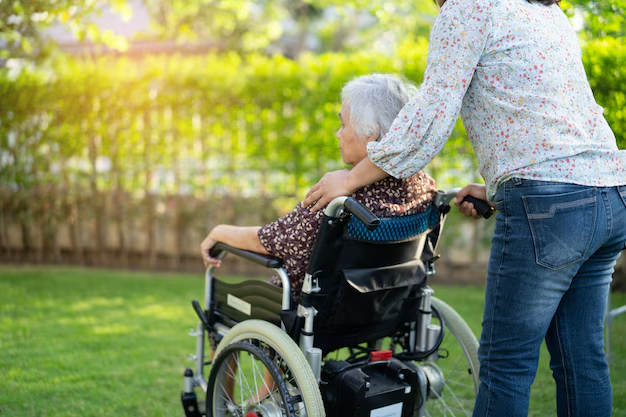Your Guide to Does Medicare Cover Power Chairs
What You Get:
Free Guide
Free, helpful information about Medicare Insurance and related Does Medicare Cover Power Chairs topics.
Helpful Information
Get clear and easy-to-understand details about Does Medicare Cover Power Chairs topics and resources.
Personalized Offers
Answer a few optional questions to receive offers or information related to Medicare Insurance. The survey is optional and not required to access your free guide.
Can Medicare Help You Get a Power Chair? Here's What You Need to Know
Navigating the complexities of healthcare coverage can feel like a full-time job, especially when it comes to mobility aids like power chairs. For those with limited mobility, a power chair isn't just a convenience; it’s a lifeline. So, can Medicare cover the costs associated with these vital pieces of equipment? Let’s cut to the chase and examine what Medicare can do for you.
Does Medicare Cover Power Chairs?
The short answer is: Yes, but with conditions. Medicare Part B (Medical Insurance) does cover power-operated vehicles (scooters) and power wheelchairs as durable medical equipment (DME), provided they are deemed medically necessary. This necessity means that the equipment is required to navigate your home, and there is no less costly alternative that meets your needs.
To qualify, a physician or practitioner must provide a written order stating the medical necessity. The requirements can be stringent, involving tests or evaluations to ascertain your need for the equipment. Once your healthcare provider submits the documentation, Medicare Part B typically covers 80% of the Medicare-approved amount, leaving you responsible for the remaining 20%, plus any deductibles.
Steps to Get Covered
- Visit Your Doctor: First, see your physician to determine whether a power chair is the best option for your needs.
- Get a Prescription: If deemed necessary, your doctor will provide a prescription and supporting documentation.
- Choose a Supplier: Make sure to choose a Medicare-approved supplier, as using a non-approved provider can result in denied claims.
- Submit Documentation: Ensure all paperwork is correctly filed and submitted to Medicare for approval.
Financial Assistance Beyond Medicare
While Medicare provides some relief, the 20% out-of-pocket cost can still be significant. Fortunately, several programs and financial resources can provide additional support:
Government Aid and Assistance Programs
- Medicaid: For those who qualify, Medicaid can offer more comprehensive coverage, including the remaining 20% not covered by Medicare.
- Veterans Affairs: Veterans might also access equipment through the VA, often with more favorable terms.
Financial Aid and Debt Relief
- State Assistance Programs: Check local and state programs that offer assistance to those with disabilities.
- Charitable Organizations: Groups like the Muscular Dystrophy Association may offer grants or assistance.
Credit Solutions
- Medical Credit Cards: Some might utilize medical credit cards designed to help cover healthcare expenses without immediate financial strain.
- Low-Interest Loans: Consider low-interest personal loans tailored for healthcare expenses as a viable option.
Expanding Your Financial Horizons
Aside from direct financial assistance, keeping your overall financial health robust is crucial. Consider exploring educational grants or credit counseling services that can ease economic stress, improve your credit score, and provide financial literacy.
Quick Guide to Financial Assistance for Power Chairs
- 🏢 Medicaid: Offers expanded coverage for those who qualify.
- 🇺🇸 Veterans Affairs: Comprehensive support for veterans.
- 🏛 State Programs: State-specific assistance for residents with disabilities.
- 🤝 Charitable Organizations: Non-profits offering grants and support.
- 💳 Medical Credit Cards: Tailored for healthcare expenses.
- 🏦 Low-Interest Loans: Flexible personal loan options for medical costs.
- 📚 Educational Grants: Explore financial education opportunities to improve financial management skills.
Navigating Medicare and related financial solutions can be overwhelming, but understanding your options is the first step toward gaining the support you need. With thorough research and strategic choices, you can ease the financial burden of acquiring a power chair and take a significant step toward enhanced mobility and independence.
What You Get:
Free Medicare Insurance Guide
Free, helpful information about Does Medicare Cover Power Chairs and related resources.

Helpful Information
Get clear, easy-to-understand details about Does Medicare Cover Power Chairs topics.

Optional Personalized Offers
Answer a few optional questions to see offers or information related to Medicare Insurance. Participation is not required to get your free guide.


Discover More
- Am I Elgible For Medicare
- Am I Enrolled In Medicare
- Am I Qualified For Medicare
- Are Adult Diapers Covered By Medicare
- Are Chemotherapy Drugs Covered By Medicare Part d
- Are Colonoscopies Covered By Medicare
- Are Covid Tests Covered By Medicare
- Are Cpap Machines Covered By Medicare
- Are Cpap Supplies Covered By Medicare
- Are Dental Implants Covered By Medicare
